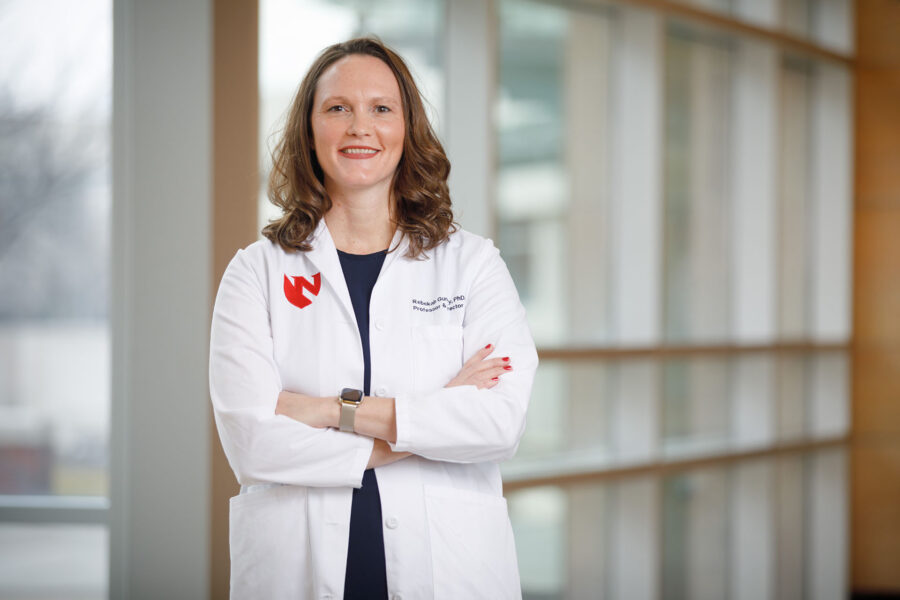A new National Institutes of Health grant awarded to Center for Heart and Vascular Research at the University of Nebraska Medical Center signals the future of UNMC’s leadership in tackling diseases that are the leading cause of death and hospitalization in Nebraska and across the U.S.
The Center for Heart and Vascular Research, under the direction of principal investigator Rebekah Gundry, PhD, recently was awarded more than $11.8 million by the National Institutes of Health to create a Centers of Biomedical Research Excellence (COBRE) focused on finding answers for heart and vascular diseases. The COBRE is a considerable stamp of approval and source of support from the National Institutes of Health and its National Institute of General Medical Sciences.
“The achievement of this significant and prestigious National Institutes of Health COBRE grant officially marks heart and vascular research as the latest of UNMC’s signature programs of expertise, yet another way we are proud to lead our nation and the world,” UNMC Chancellor Jeffrey P. Gold, MD, said.
“But most important,” Dr. Gold continued, “the work done thanks to this support will someday make a true difference in the lives of our patients, and the families who love them. This is why we go to work every day.”
The COBRE will grow a center that develops early career researchers, promotes collaborative research and supports research into heart and vascular diseases through cutting-edge infrastructure and invaluable mentoring.
Dr. Gundry is especially excited that the COBRE goes beyond empowering UNMC’s current accomplished cadre of heart and vascular disease scientists and charges UNMC and the Center for Heart and Vascular Research with developing the next generation of outstanding heart and vascular disease investigators at the medical center and in the U.S.
“The whole idea is to establish a pipeline for which we nurture, we grow, we mentor early career investigators to become independent,” Dr. Gundry said, meaning they ascend to the point that their heart and vascular disease research labs are fueled by NIH or other independent funding.
So, the COBRE doesn’t just support the early career scientist’s ability to do research. It also supports a senior scientist’s ability to mentor the early career scientist in all aspects of the job. And that creates more senior scientists, operating at the top of their respective games.
“It’s all tied together,” Dr. Gundry said. “And the reality is we’re better as a group.”
UNMC early-career investigators now receiving NIH funding as part of the COBRE include Jeffrey Salomon, MD, who studies the microbiome in congenital heart disease. Pediatric cardiac research like this means, “You have the opportunity to set that person up for a better life long-term, with perhaps fewer need for interventions later on,” Dr. Gundry said.
“After so much hard work by so many individuals, it is very exciting to have this opportunity,” Dr. Salomon said.
Marian Urban, MD, PhD, is just as enthusiastic about the new support for his project: “This grant will provide significant resources to advance the donor organ intervention research and will ultimately increase the number of donor hearts available for transplantation,” he said.
Jason Cook, MD, PhD, also will receive NIH funding as an early-career research project leader as part of the COBRE.
Windy Alonso, PhD, assistant professor of nursing, was to have been the fourth, and she contributed to being awarded the grant. But meanwhile, she’s already achieved her own independent federal funding. Another deserving research project leader will be identified to fill that spot, Dr. Gundry said.
The COBRE grant also allows UNMC to develop and support critical research infrastructure that catalyzes innovative heart and vascular disease research including a new CHVR Bioassay Core.
The Center for Heart and Vascular Research already capitalizes upon the Nebraska Cardiovascular Biobank and Registry, “one of the most amazing human specimen biobanks that exist,” Dr. Gundry said. The Center for Heart and Vascular Research also benefits tremendously from a partnership with Nebraska Medicine, which has one of the largest heart failure and transplant programs in the country and one of the busiest academic vascular surgery services in the Midwest.
But the momentum is just beginning.
“One of the practical strategic aspects of doing research is thinking about what can you do that you can do better than anyone else?” Dr. Gundry said. “What can you do that’s different? That will still be impactful, but help you do something that sets yourself apart and above what is possible elsewhere?
“Here it’s really a perfect storm of the right personnel, the right leadership, the right infrastructure, right facilities that are going to do those (impactful) things.”
This is UNMC’s third funded COBRE as an institution, with a fourth set to be submitted for proposal in spring 2024.
About UNMC
As Nebraska’s only public academic health science center, the University of Nebraska Medical Center enrolls more than 4,400 students across six colleges, two institutes and a graduate studies program. Its mission is to create a healthier future for Nebraskans through premier education, research and clinical care, but its impact — rooted in a culture of collaboration, big ideas and public-private partnerships – goes far beyond, in areas that include infectious diseases, rural health, cancer research and treatments, global health security, and simulation and experiential learning technologies.
